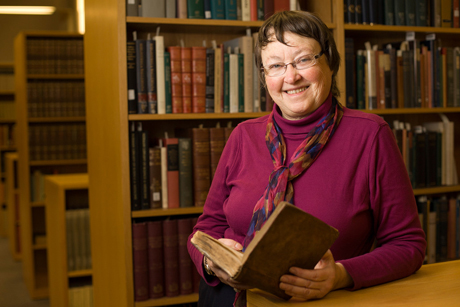Mary Beth Norton reveals the Pilgrims' strange world
By Linda B. Glaser

At the fall Distinguished Faculty Invitational Lecture for Phi Beta Kappa Nov. 13, Mary Beth Norton, the Mary Donlon Alger Professor of American History, offered a look at some of unusual elements of 17th-century America before the Enlightenment brought science and reason to the colonies.
The inhabitants of early America believed in what we would call magic, said Norton, belief that the invisible world of spirits is as real as the visible world. “They also had very different beliefs about sex and sexuality, such as that a woman had to have an orgasm to conceive a child.”
Norton described a 1680 murder case in which the grandmother of an illegitimate baby was proved innocent of the child’s death because when she touched the body it didn’t bleed. It did bleed when the baby’s father touched it – particularly compelling proof since the child had been buried for at least a month. This folk belief that a victim’s body would bleed if touched by the murderer had been prevalent in medieval Europe.
The Salem witch trials involved another type of proof-by-touch, said Norton. Strange fits suffered by victims were proven to be caused by witches because when an alleged witch touched a girl, the fit instantly ceased. According to the judges, this was because invisible particles left the witch’s eyes to attack a victim when she or he looked at them. When the witch touched the victim, the “circuit was completed” and the particles returned to the witch’s body, so the victim’s torments ceased.
One of the most fascinating tales Norton said she’d ever come across involved an intersex court case with surprisingly modern overtones. It occurred in 1629 in Virginia, when a person named Hall was brought before the General Court – not for a crime, but because the neighbors were confused about Hall’s sexual identity. Christened and raised as a girl, at times Hall dressed as a man; at other times as a woman. What sex was this person?
On multiple occasions, Hall’s body was examined by groups of women and by men, who all declared Hall was physically a man. But while the women unanimously relied on the physical characteristics to determine Hall’s identity, some men, relying on Hall’s “feminine” behavior, saw Hall as female or as a male-female combination.
Upon questioning, Hall described a unique anatomy with ambiguous physical characteristics and refused to choose a gender identity, instead self-identifying as “both man and woeman.” Remarkably, said Norton, the court ultimately accepted Hall’s self-definition as both man and woman. The court ordered Hall to dress as a man, but also to wear a woman’s head covering and apron.
“The Virginia General Court’s solution to the dilemma posed by Hall was to create a unique category; by court order, Hall was now a dual-sexed person,” said Norton. “A society in which gender – the outward manifestation of sex – served as a fundamental dividing line had formally designated a person as belonging to both sexes.”
Phi Beta Kappa is the nation’s oldest and most prestigious academic honors society for students of the liberal arts and sciences. Cornell chapter faculty president Daniel R. Schwarz, the Frederic J. Whiton Professor of English and a Stephen H. Weiss Presidential Fellow, noted that the chapter has developed significantly in recent years with support from the deans of the College of Arts and Sciences, instituting Junior Phi Beta induction, sponsoring the Phi Beta Kappa Distinguished Faculty Invitational Lecture Series, and launching a Web page as well as creating an active alumni association and alumni board. The chapter is raising an endowment for a scholarship and a teaching prize.
Linda B. Glaser is staff writer for the College of Arts and Sciences.
Media Contact
Get Cornell news delivered right to your inbox.
Subscribe